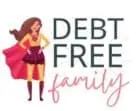Financial freedom is the ability to live the life you want without financial worries. It requires setting specific life goals, determining lifestyle requirements, calculating the savings you need and establishing financial mileposts to achieve these goals. So, let’s dig in and see how we can make it happen!

I'm Steph, mum of three! 👋
Here, I share practical insights on making (and saving!) money. With a knack for budgeting and a passion for financial freedom, I've picked up lots of tips & tricks along the way. And I can't wait to share them with you here!

What is Financial Freedom?
Financial freedom is achieved when you’ve enough wealth and assets to sustain your lifestyle without relying on employment income. This allows for greater control over your personal and financial decisions and the ability to pursue passions and goals without financial stress. It’s not easy and it’s not quick, but it can be done.
Sounds good? Read on :)
Related Posts
- Get out of debt, Fast!
- The truth about UK saving habits
- How to helps your teens manage their money
- Unique side hustles to help you make extra cash!
- The best budgeting apps in the UK
Life Goals
When we think about achieving financial freedom, it’s easy to get lost in a sea of possibilities and questions. However, setting specific life goals is a crucial step in making that financial freedom a reality.
This involves taking the time to look at the way you want your life to be and painting a clear picture of what you want your future to look like. From here, you can begin to calculate the savings required and set a deadline for reaching those goals.
To stay on track, establishing financial mileposts will help you track and celebrate your progress along the way.

Your Lifestyle Wish List
To achieve financial freedom, it is crucial to determine your lifestyle requirements. This involves understanding your personal goals and identifying the amount of money necessary to achieve them. By calculating the savings required and setting a deadline, you can establish financial mileposts.
It’s generally recommended you review your monthly budget and make necessary adjustments to align it with your lifestyle requirements.
This helps to ensure that spending is within your means and you save enough for those annoying but inevitable emergencies.
Deadlines
To ensure you’ve planned enough time to make financial freedom happen for you it is important to calculate the amount of savings required to meet your financial objectives along with deciding on a deadline. This is daunting and can be a little complicated.
Here is a 4-step guide to calculate savings required and deadline:
- Determine your lifestyle requirements – Take a long hard look at your outgoings and see if you can find areas where you can reduce costs. Once you have a clear understanding of the amount of money needed for your day-to-day living expenses, you can move on to the next step.
- Calculate savings required – Based on your goals and present money situation, determine the amount of money you need to save each month.
- Set a Deadline – It is important to set a timeline for achieving your financial goals. For example, you might want to save £5,000 in two years or £15,000 in five years.
- Monitor Progress Regularly – Tracking the progress towards making sure you achieve these goals is essential. Regular monitoring will help you stay committed and make necessary adjustments if required.
In addition, while calculating the savings you need and a realistic deadline, be mindful of unique details such as unexpected expenses or changes in income that may require a change to the plan.

Money Mileposts
It’s super important to define financial mileposts that will guide you from one stage to another in your journey towards financial freedom. These milestones can be short-term such as paying off your credit cards or long-term, such as retirement planning.
Keeping on top of these of these mileposts can provide feedback on the effectiveness of any plan you’ve come up with. It also is great for helping you remain objective and focused on getting to a better financial position and keeping your eyes on the prize!
I think this quote is pretty accurate ‘budgeting is like a diet for your wallet – painful at first, but it pays off in the long run‘. And just like a diet, consistency is the key.
Make a Monthly Budget
One of the keys to achieving financial freedom is learning to manage your income and work with what you have.
Here is a practical 6-step guide to creating a budget plan that aligns with your unique objectives:
- Track your monthly expenses and income – being aware of what you’ve got coming in and leaving your account is crucial. End of.
- Identify areas where you can cut back on spending – Try and get into the habit of regularly checking your outgoings and making small changes where you can.
- Make saving a priority – We’re often told my the money experts to make saving a priority, save a little on payday (preferably by standing order to another account so you don’t even have to think about it) and this is a good idea. If you try to save with what’s left at the end of the month…..they’ll be nothing left!
- Stick to the budget plan – Just stick to it :)
It’s important to keep in mind that sticking to a monthly budget requires discipline and commitment. Don’t be too hard on yourself.

Pay off Credit Cards in Full
One important step towards achieving financial freedom is to clear your credit card debts in full. Easier said than done in a lot of cases and if you have credit card debt, that needs dealing with first.
Once you find yourself without a credit card balance, firstly well done (it’s not easy!) and second, try your very best to keep it that way! Throw everything you can at the debt, and always pay over the minimum amount due, that way you’re attacking the balance, not only ever paying off the interest.
If you’re drowning in debt and need serious help, contact the Citizens Advice Bureau.
Automatic Savings
Financial freedom is a goal that so many of us want. It’s having the ability to make choices without being limited by financial constraints.
One effective way to work towards financial freedom is by creating automatic savings, as I mentioned above. By doing so, you can set aside money without having to think too hard about it.
It takes just a few minutes to set up a standing order between accounts, do it for the same day you get paid and the money will leave as soon as it arrives: you’ll never even see it!

Watch Your Credit Score
As someone who (finally!!) values being financially stable, I understand the importance of keeping a good credit score.
One way to do this is by regularly checking your credit reports, which can give you insight into your credit standing and alert you to any errors that might be affecting you.
Another option is to consider using a free credit score monitoring service to keep track of changes to your credit score and receive alerts in case of suspicious activity.
There are free services for this, so absolutely no need to pay a monthly subscription fee.
Get Good At Negotiating!
I’ve found that negotiation plays a key role in saving some cash!
Whether it’s negotiating for a better price on that big new purchase you have to make (thanks, broken washing machine) or finding ways to save money and cut costs, every little bit can make a big difference in the long run.
It’s awkward sometimes isn’t it, asking for discounts. I find it awkward anyway. But what’s the worst that can happen? You get a No.
Financial Freedom is Possible with Planning. Really!
Achieving financial freedom is a feasible goal that can be smashed through discipline and planning.
By setting clear financial goals, tracking expenses, and reducing debt, you can take control of your finances. With determination and perseverance, individuals can overcome financial barriers and create a secure financial future. It’s not impossible.
Some Facts About Financial Freedom:
- ✅ Financial freedom requires having enough savings, investments, and cash to afford the lifestyle you want for yourself and your family. (Source: Team Research)
- ✅ Setting specific life goals and creating a blueprint for achieving those goals is essential for financial freedom. (Source: Team Research)
- ✅ Making and sticking to a monthly budget is the best way to guarantee all bills are paid and savings are on track. (Source: Team Research)
- ✅ Paying off credit cards in full and carrying as little debt as possible helps prevent overspending and accumulating debt. (Source: Team Research)
FAQs about What Is Financial Freedom?
What is financial freedom?
Financial freedom is the ability to have enough savings, investments, and cash on hand to afford the lifestyle you want without being driven by the need to earn a certain amount each year. It includes growing a nest egg that will allow you to retire or pursue any career you want.
Why do many people fall short of financial freedom?
Many people fall short of financial freedom due to escalating debt resulting from overspending, even without occasional financial emergencies that can disrupt their plans. Also, when a major crisis completely disrupts all plans, it reveals additional holes in safety nets.
What are the 12 habits that can put you on the right path to financial freedom?
The 12 habits that can put you on the right path to financial freedom include setting life goals, making a budget and sticking to it, paying off credit cards in full, creating automatic savings, taking care of your belongings and health, being financially independent, starting investing now, watching your credit score, negotiating for goods and services, staying educated on financial issues, adjusting tax laws and deductions, and handling financial emergencies.
What is the importance of watching your credit score?
Your credit score is a very important number that determines the interest rate you are offered when buying a new car or refinancing a home. It also impacts the amount you pay for a range of other essentials, from car insurance to life insurance premiums. Maintaining a good credit score is a reflection of responsible financial behaviour.
How can negotiating for goods and services help you achieve financial freedom?
Negotiating for goods and services can help you achieve financial freedom by allowing you to save some money. Many businesses are open to negotiation, so buying in bulk or positioning yourself as a repeat customer can open the door to good discounts.
